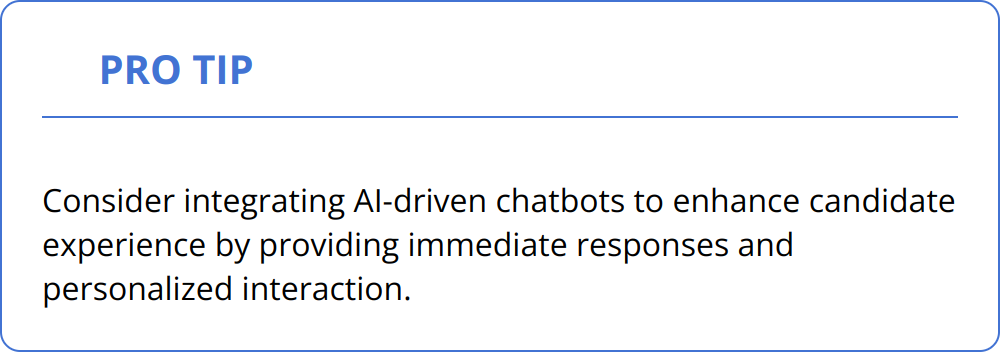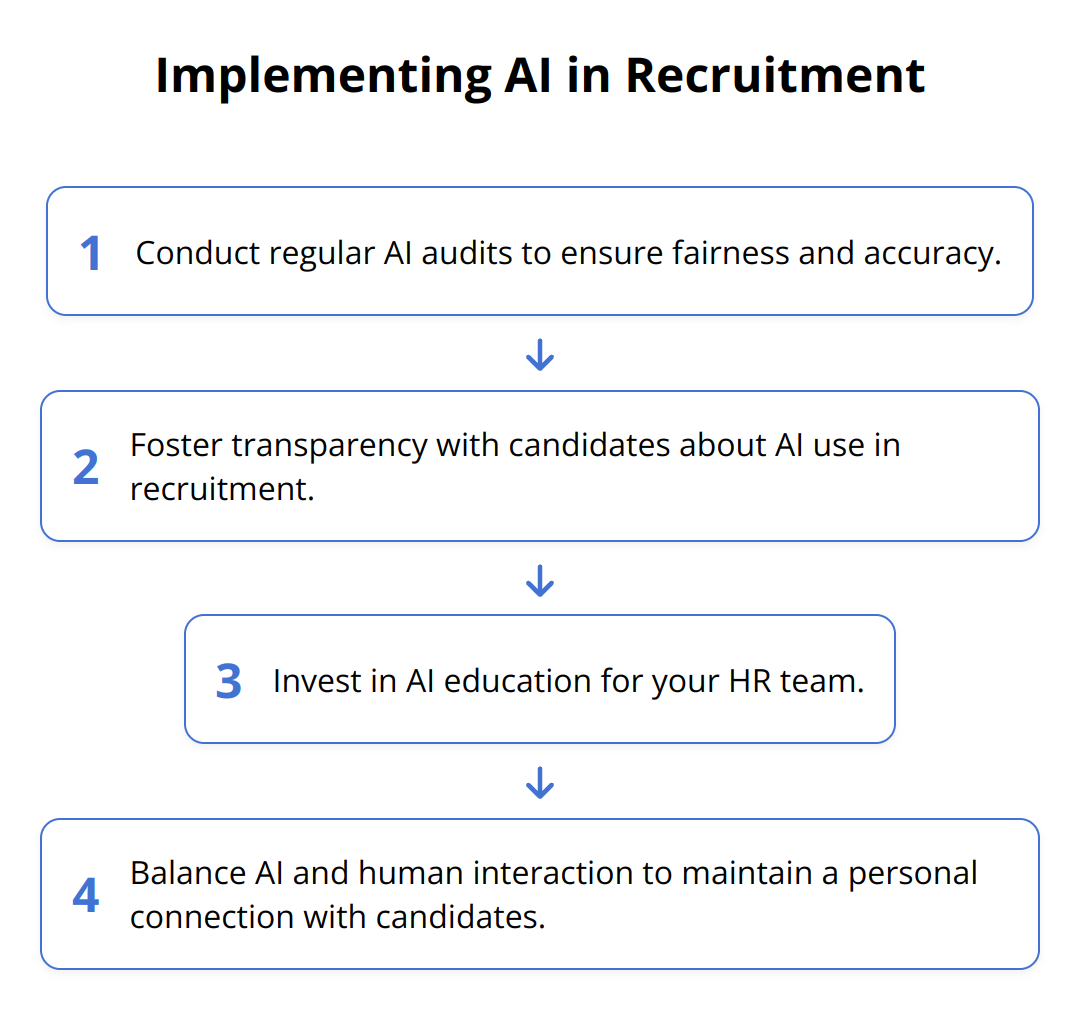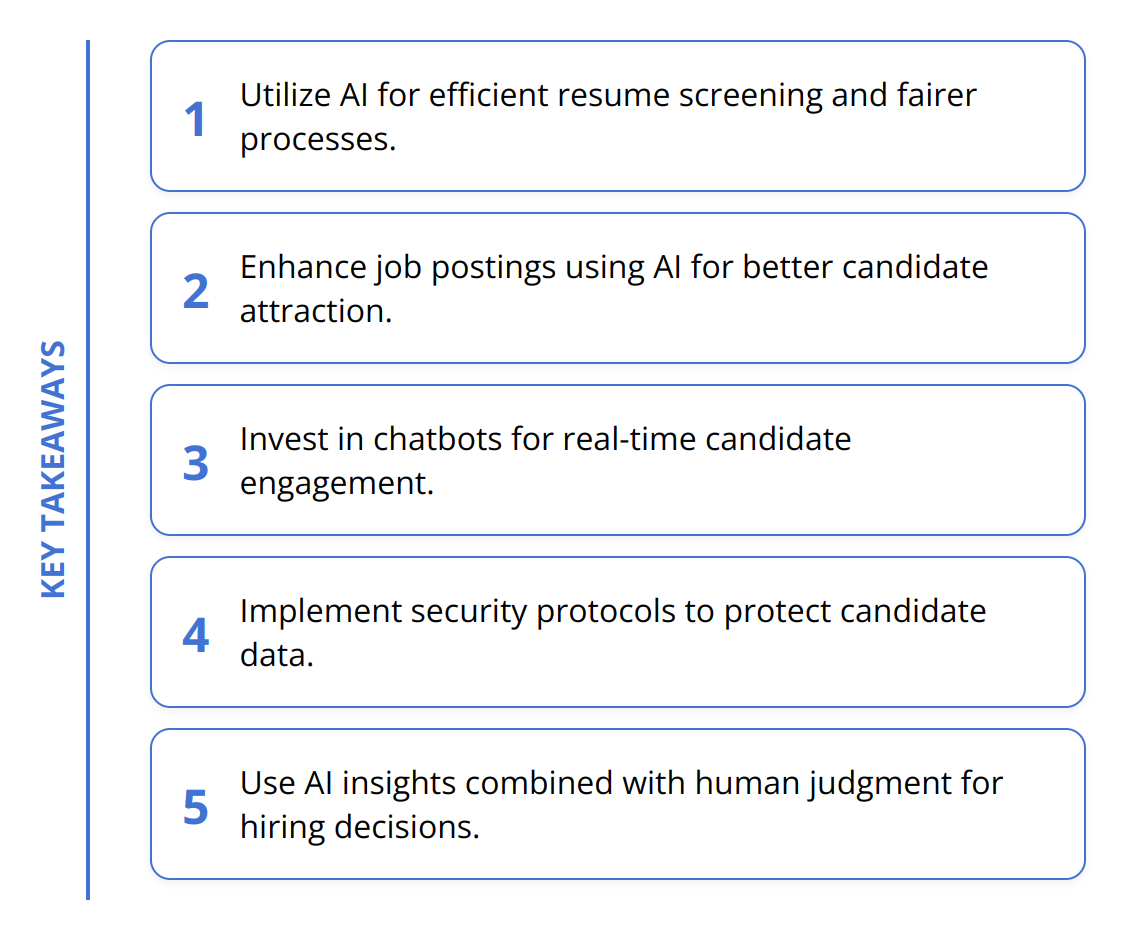The impact of Artificial Intelligence on the recruitment space is undeniable and transformative. At FutureWave Research, we’ve observed a significant shift in how talent acquisition processes evolve with AI integration.
This advancement offers opportunities to enhance efficiency and effectiveness in finding the right candidates. However, it also presents unique challenges that organizations must navigate carefully.
AI Revolutionizing Recruitment
Artificial Intelligence is drastically changing the landscape of talent recruitment, making processes more efficient and effective. Leveraging AI, companies can now create more attractive job postings, streamline the resume screening process, and engage with candidates in a more personalized way. Here’s how:
Optimizing Job Postings with AI
Crafting the perfect job posting is an art, and AI is the painter’s brush. AI tools analyze successful job listings and identify keywords and phrases that attract top talents. This means job descriptions are not only more appealing to candidates but also optimized for search engines, increasing visibility. The result? A higher caliber of applicants. For instance, Google’s use of AI in job postings has been a game-changer, showing that the right wording can significantly expand the pool of applicants.
Streamlining Resume Screening
Manual resume screening is time-consuming and prone to bias. AI steps in as a game-changer. By automating the screening process, AI can quickly analyze resumes, matching qualifications with job requirements with unparalleled accuracy. Tools like LinkedIn’s AI-driven algorithms are already making strides, ensuring that only the most suitable candidates move forward. This not only saves precious time but also enhances the fairness of the recruitment process.
Engaging Candidates
AI-driven platforms transform candidate engagement from a mundane task into a dynamic part of the recruitment process. Chatbots, for example, provide immediate responses to candidate queries, improving the experience and maintaining their interest in the position. These AI tools can schedule interviews, send reminders, and even provide personalized feedback, making the process smoother for both recruiters and candidates. This level of interaction ensures candidates stay engaged and informed throughout the recruitment journey.

Practical Tips for Implementing AI in Recruitment
- Begin with an AI audit of your current recruitment process to identify areas for improvement.
- Focus on data quality. AI’s performance heavily depends on the quality of data fed into it.
- Provide training for your HR team on using AI tools effectively.
- Pilot AI tools in specific areas of your recruitment process before a full-scale roll-out.
In summary, AI is not just a tool but a transformative force in talent recruitment. By enhancing job postings, streamlining resume screening, and improving candidate engagement, AI allows companies to attract and identify the best talents efficiently. As the technology evolves, staying ahead means embracing AI, making it a central part of your recruitment strategy.
Benefits of AI in Talent Recruitment
Artificial Intelligence (AI) in talent recruitment is no longer a futuristic concept but a present reality, offering substantial benefits that revolutionize the hiring process. The application of AI within recruitment allows for a faster, more precise, and candidate-friendly approach, setting a new standard for efficiency and engagement in the talent acquisition sphere. Here we delve into these advantages.
Accelerating the Hiring Cycle
One of the most tangible impacts of AI in recruitment is the significant reduction in time-to-hire. Traditional methods could stretch the hiring process over weeks, or even months, but AI’s ability to swiftly analyze large volumes of resumes and applications cuts down hiring timelines drastically. For example, companies utilizing AI-driven screening tools report a reduction in their hiring cycle by up to 75%. This rapid pace ensures that businesses can fill vacancies quicker, maintaining operational efficiency and competitive edge.

Elevating the Quality of Hires
AI doesn’t just speed up the recruitment process; it enhances the quality of candidates selected for interview stages. By employing sophisticated algorithms, AI tools assess not only the hard skills but also the soft skills and cultural fit of candidates. This comprehensive analysis results in a higher match accuracy between job requirements and candidate profiles. Studies show that businesses leveraging AI for talent acquisition report a 20% increase in employee performance and a significant decrease in turnover rates. This highlights AI’s efficacy in identifying candidates who are likely to excel and stay longer with the company.

Boosting Candidate Engagement
AI transforms the candidate experience from the first interaction. Through personalized communication and interactive interfaces like chatbots, candidates feel valued and engaged throughout the process. AI-powered systems can provide timely updates, feedback, and even career advice, fostering a positive perception of the company brand. Enhanced engagement leads to higher application completion rates and improves the likelihood of top candidates accepting job offers. Moreover, AI tools gather insights on candidate preferences and behaviors, enabling further refinement of the recruitment strategy to attract the best talent.
Actionable Takeaways
- Invest in AI tools that offer analytics capabilities for better decision-making.
- Implement feedback loops between your AI systems and recruitment team to continuously improve the hiring process.
- Ensure your AI solutions are compliant with data protection regulations to safeguard candidate information.
By incorporating AI into talent recruitment strategies, companies can achieve a synergy of speed, accuracy, and candidate satisfaction that traditional methods can’t match. This not only elevates the hiring process but also positions businesses as forward-thinking leaders in the competitive talent market.
Navigating AI Recruitment Challenges
As we integrate Artificial Intelligence (AI) into recruitment processes, we face a number of challenges that must be addressed to fully leverage its potential. Protecting candidate data, ensuring fairness, and maintaining the human touch are paramount. Here, we offer insights and practical advice to overcome these hurdles.
Protecting Candidate Data Privacy
In an era where data breaches are all too common, securing candidate information is essential. AI systems process vast amounts of personal data, making them prime targets for cyberattacks. To mitigate this risk, it’s imperative to implement advanced security protocols and encryption measures. Regularly conducting security audits and adhering to data protection regulations such as GDPR can help safeguard sensitive information. Companies should also be transparent with candidates about how their data will be used and stored.
Tackling Bias in AI
Although AI can significantly reduce human bias in recruitment, the technology itself is not free from this issue. AI algorithms learn from historical data; if this data contains biases, the AI will inherently adopt them. To counteract this, it’s critical to regularly review and update the AI algorithms and the data sets they learn from. Diverse teams creating and overseeing AI systems can provide varied perspectives, helping to identify and eliminate potential biases. Furthermore, combining AI insights with human judgment ensures a more balanced decision-making process.
Bridging the Human-AI Gap
While AI enhances efficiency in recruitment, the human element remains irreplaceable. Candidates appreciate genuine interactions, and a fully automated process can feel impersonal. Integrating AI in a way that supports rather than replaces human recruiters is key. AI can handle time-consuming tasks like resume screening and initial candidate queries, freeing up human recruiters to focus on interviews and candidate relationships. This blend of technology and human insight creates a more personalized and satisfying recruitment experience for candidates.

Practical Advice for Implementing AI in Recruitment
- Conduct regular AI audits to ensure fairness and accuracy in the screening process.
- Foster transparency with candidates about AI use in recruitment, enhancing trust and compliance.
- Invest in AI education for your HR team to maximize the technology’s benefits while acknowledging its limitations.
- Balance AI and human interaction in the recruitment process to maintain a personal connection with candidates.
AI in recruitment presents a landscape filled with opportunities and challenges. By focusing on data privacy, addressing bias, and ensuring a human-centric approach, companies can harness the power of AI to revolutionize their talent acquisition strategies.
Final Thoughts
The journey toward integrating Artificial Intelligence in recruitment processes marks a significant milestone in how companies approach talent acquisition. This transformative tool brings to the table efficiency, accuracy, and an enhanced candidate experience that are unparalleled compared to traditional methods. By optimizing job postings, streamlining resume screenings, and engaging candidates more personally, AI is reshaping the recruitment landscape in ways we at FutureWave Research believe are fundamental for any forward-thinking organization.

However, the path to effectively implementing AI in recruitment is not without its challenges. Issues such as data privacy, algorithmic bias, and maintaining the human touch in recruitment processes are areas that require thoughtful consideration and strategic action. We encourage organizations to adopt AI in their recruitment strategies, but to do so with a mindful approach to these challenges. It’s about striking the right balance between leveraging cutting-edge technology and preserving the human elements that are essential to the recruitment process.
At FutureWave Research, we’re committed to providing insights and guidance on how to navigate the complexities of AI and other technological advancements. We believe in the power of technology to drive positive change, and AI in recruitment is just one area where this potential is abundantly clear. For organizations looking to stay ahead of the curve and attract the best talents, the adoption of AI in recruitment processes is not just an option but a strategic necessity.
We invite you to explore more about how technology can transform your strategies and operations. Check out our insights at FutureWave Research. Together, let’s embrace the future of work and technology, making well-informed decisions that lead to success and societal betterment.

